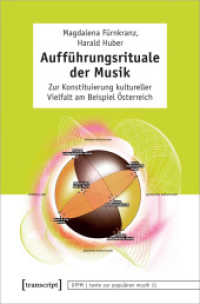Full Description
Mapping the Terrains of Student Voice Pedagogies is an autoethnography of McDermott's experiences with student voice reforms. Ultimately, the author is concerned with better understanding the possibilities for student voice as a transformative teaching and learning practice within the context of neoliberal education. The discussion is anchored in two past student voice projects in which McDermott was involved, one as a researcher and one as a facilitator. As method, the author revisits these experiences through memory and various artifacts to unpack embodied voices of difference. More specifically, McDermott is concerned with how teachers take up student voice in their pedagogies, how teachers come to understand themselves and their students in terms of student voice, and how social differences contour student voice pedagogies. The author queries: How do experiences with student voice inform teacher student relationships? And, how are student voice practices shaped, organized, and inscribed through social difference? Grounding this inquiry is post-structural feminist anti-racism as an interwoven discursive orientation and politics for troubling and transforming schooling and education. Analyses address how McDermott's presence as an individual and as a member of socio-historical groups in the student voice initiatives affected the projects' dynamics. The findings amplify the necessity of time and space for educators to critically reflect on their practices when implementing reforms, time and space that were provided by engaging autoethnography. The book contributes important strategic processes towards realizing the necessary goals of critical reflexive practices in teaching and learning, addressing the question of 'how' one might do critical reflection through autoethnography.
Contents
Introductions - Theorizing Student Voice Pedagogies - Contours of Student Voice - Situating Autoethnography in the Cartography - Shifting Terrains of Student Voice and Transformative Teaching and Learning - «Finding Voice»: Acoustic Contours of Difference and Recognizability - Affect Matters in Permutations in Student Voice Encounters - Remapping the Contours of Student Voice with Desire - Willing Disorientations: Unsettling Student Voice Possibilities.








